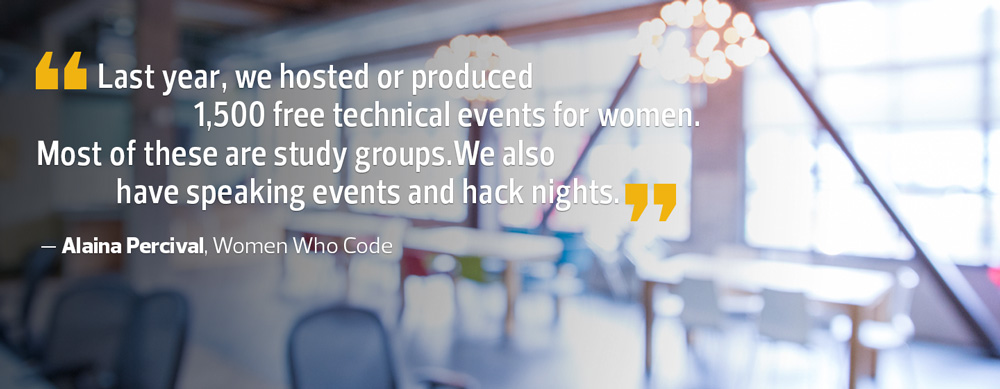Women Who Code’s CEO Takes on Gender Inequality in Tech
Four years ago, Alaina Percival didn’t know how to code. Now, the self-taught coder leads a San Francisco–based nonprofit helping more than 50,000 women excel in technology careers.
Women Who Code helps women across 60 cities and 20 countries advance their technology careers. But much work remains. In 2015, only 30 percent of Google’s 56,000 employees were women, according to the tech giant. And in 2014, Twitter revealed that only 10 percent of its technical workforce was female.
To learn more about Women Who Code, BizTech Managing Editor Chris Sapardanis spoke with Percival about the challenges women face in pursuing technology careers and what her organization offers.
SIGN UP: Get more news from the BizTech newsletter in your inbox every two weeks!
BIZTECH: What’s the biggest challenge women face in technology?
Percival: There is definitely a lack of role models. There is already a small percentage, or an under-representative amount of women as individual contributors, but then it’s even lower in leadership roles. That’s one of the things we are really working to change.
We surface more role models. We help women become more comfortable talking about their career successes, and encourage them to engage in the tech community. We have a weekly publication called the Code Review that is dedicated to highlighting the successes of women in technology and encouraging women to engage in the tech community.
We also gave away more than $227,000 in conference tickets and more than $249,000 in scholarships for educational experiences last year. We really work to raise their profile and get women to participate in the tech community, both as leaders and in their own networks.

BIZTECH: How does Women Who Code help its members?
Percival: Last year, we hosted or produced 1,500 free technical events for women. Most of these are study groups. We also have speaking events and hack nights. The programs vary, but they maintain a technology focus. Then we weave in aspects of leadership and career development.
Our study group might be on a programming language, such as Ruby on Rails or JavaScript. And then we’ll connect and figure out who wants to work together on projects. It really targets women who already have some technical skills. We provide the space and the environment that includes a little social pressure to help them reach their goals.
Another thing we emphasize is giving talks. A regular study group might be anywhere from 20 to 35 people. So it’s not very intimidating to give your first tech talk there. It may be a five-minute lightning talk at the beginning of one of our events on the same subject matter. That gives you the opportunity to give a talk, and then maybe your next talk will be at your company or at a conference. It helps you take that next step.
BIZTECH: How does Women Who Code develop leaders?
Percival: Leadership is a huge focus for us. We have more than 100 leaders in the organization. It’s a volunteer position, but a very prestigious role. What that means is in Mexico City, Atlanta or San Francisco, for example, we have directors who decide on programming for that city. These women very quickly become leaders in the tech industry in general. They are called into companies as thought leaders, they experience career acceleration, and they are asked to speak at conferences.
There is usually between one and four directors in each city, and these are contracted volunteers who go through a training process. It generally takes us three to six months to launch a new network. But it doesn’t mean that we have just one event in that city. It means that we are there on the ground, having regularly occurring events. The goal is to have one event per month at a minimum. Some of our more active networks have several events per week.
We’re biggest in the Bay Area, New York, Washington, D.C., and London. But we recently launched in Berlin, and that’s growing quickly. Then we’re in several cities in Mexico, and those networks are picking up speed.









